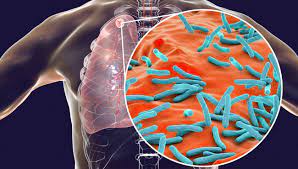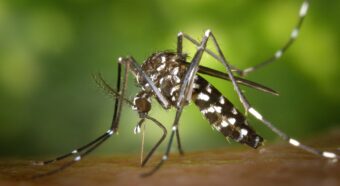“End Tuberculosis in Cameroon by 2030” – A Realistic Goal?
- October 30, 2023
- Tuberculosis
- By The Bureau
- Read in French

According to the World Health Organisation (WHO), Cameroon, located in Central Africa, is ranked among the 30 High Tuberculosis (TB) burden countries in the world.
The 2022 Global Fund Report Findings on Cameroon
- 25,000 people are undergoing TB treatment;
- 150 people are on Multidrug-resistant TB treatment (MDR-TB);
- 4,200 people with HIV and TB are on antiretroviral therapy (ART); and
- 6,800 people exposed to TB received preventive therapy.
Progress rate of efforts to fight TB in Cameroon since 2010 in the same report:
- TB treatment coverage increased from 47% in 2010 to 50% in 2021;
- TB treatment success rate (all forms) increased from 78% in 2010 to 86% in 2020;
- MDR-TB treatment success rate which stood at 89% in 2010 dropped to 83% in 2019; and
- The rate of HIV and TB patients on ART increased from 51% in 2010 to 99% in 2021.
Moreover, according to the magazine Actu Cameroun, more than 22,000 people are infected with TB in Cameroon and 5.1% of cases concerned children aged 0-14 years and 98% of HIV and TB patients are on ART.
Strategies to Fight TB in Cameroon
The 2020-2024 National Strategic Plan (2020-2024 NSP) of the National TB Control Programme (NTP) in Cameroon is the reference framework for TB interventions within the country. Its vision is “A Cameroon free from TB with zero deaths, disease and suffering due to TB” and its mission is to “End TB in Cameroon by 2030”. To achieve its mission, the NTP put in place a national strategy based on screening and early diagnosis of TB cases; proper treatment of patients; disease prevention; community participation; training of health personnel; advocacy, communication and social mobilisation; epidemiological surveillance; systematic screening and management of HIV in TB patients and TB in HIV patients (collaborative TB/HIV activities); and early detection and management of MDR-TB.
Besides, TB response in Cameroon is decentralised. Decentralisation is a strategy meant to make diagnosis and treatment services more accessible and equitable for the population. The country has 254 TB diagnostic and treatment centres throughout the 10 regions and the Government has undertaken to provide treatment free of charge.
Challenges faced in TB response in Cameroon
The fight against TB in Cameroon while structurally robust as presented above faces numerous challenges in implementing interventions in the field, notably the shortage of BCG vaccines and frequent stock-outs of anti-TB drugs in recent years. For instance, according to the NGO Positive Generation, which promotes the right to health in Cameroon, stock-out rates in the country’s hospitals since the beginning of 2023 ranged between 9% and 20% depending on the month and the regions concerned.
It is obvious that drug stock-outs can only have harmful consequences on the health of affected populations such as resistance to anti-TB drugs. A specialist in the fight against TB in Cameroon who requested anonymity said repeated drug stock-outs undermine public trust. Moreover, domestic financing is not increasing significantly, civil society contribution remains barely visible and is not representative, the short-course preventive treatment is not used in Cameroon and prevention is provided only for children less than 5 years and for people living with HIV.
Furthermore, other negative effects identified include:
-
- “Increased morbidity and mortality in TB patients especially those diagnosed with MDR-TB or extensive drug resistant TB (XDR-TB) whose treatments are more complex, more toxic and less efficient.
- Reduced productivity and revenue for patients and their families who have to cope with a chronic disease, social stigma, unemployment or disability.
- A threat to global health security given that resistance to anti-TB drugs can spread beyond the borders and jeopardise international efforts to end TB’’.
Regarding the BCG vaccine, VOA Afrique, Cameroon has experienced several BCG vaccine stock-outs in recent years thereby hindering TB prevention in infants. The BCG vaccine is administered from childbirth and guarantees a 20-year protection against TB. Shortage of BCG vaccine in Cameroon has had a negative impact on the population’s health. On this issue, Jean Louis Abena, medical doctor, Public Health Specialist and former Permanent Secretary of the National TB Control Programme, in an article on the shortage of TB vaccines in Cameroon states that the immediate consequence of this shortage is “a loss of interest of the population towards vaccination and an unmet demand for vaccines. This gives rise to a drop in the programme’s performance and the need to organise communication campaigns to find patients lost-to-follow-up. It is important to note that performance is directly linked to people’s trust in the health system” (Actu Cameroun).
Reasons for failure in the fight against TB
Beyond the impact of COVID-19 that delayed progress in TB response in several countries worldwide, Cameroon faces several obstacles in its efforts to combat this disease including low screening rate (only 48% of estimated cases are detected); lack of access to health care (especially in rural areas and those affected by humanitarian crisis); delay in diagnosis and initiation to treatment, which can lead to transmission and the appearance of drug-resistant forms of the disease; and low treatment completion rate (only 83% of patients are cured) as well as lack of sensitisation and social mobilisation on the disease, which remains stigmatised and unknown.
Following, are some factors cited by an article on the distribution of drugs in Cameroon, among the reasons for the stock-out issues facing the country:
- Poor compliance with the National Essential Drug Supply System (SYNAME), which provides that the National Procurement Centre for Essential Drugs and Medical Devices (CENAME) is the exclusive supplier to public health facilities.
- The illicit sale of drugs, which fosters diversion, counterfeit and poor-quality drugs.
- Unfair competition from certain actors who charge lower prices than those set by the CENAME or who benefit from subsidies or tax exemptions.
- Cumbersome drug acquisition procedures involving several actors, thereby delaying orders and deliveries.
- Low debt recovery rate by the CENAME which limits its financial capacity to renew its stock and pay its suppliers.
- A low level of technical expertise of CENAME’s personnel which negatively affects drug management, storage and distribution.
Actions envisaged to address these challenges
The 2023-2026 NSP to close the gap of missing cases and reduce TB incidence and mortality in Cameroon called for extending diagnostic services, stepping up active case-finding, improving patient follow-up and the supply of anti-TB drugs.
Meanwhile, Dr Manaouda, the Minister of Public Health appealed for general mobilisation to relaunch activities related to this disease. He declared, ‘’We need to intensify active TB screening, particularly among people living with HIV, relatives of TB patients, people with respiratory symptoms and people at risk. We must also ensure that patients receive appropriate care by guaranteeing access to drugs, laboratory tests and psychosocial support.’’
The Minister also called for better coordination between the various actors involved in the TB response, in particular technical and financial partners, civil society organisations, the media and community leaders. He ended by announcing that the government will set up an emergency plan to accelerate TB control with support from the Global Fund to fight AIDS, TB and malaria, which is the main donor in Cameroon in this area.
Considering all the challenges to be met between now and the deadline, however, there is reason to doubt that these joint efforts could fulfil the mission to “End TB in Cameroon by 2030” as stated in the 2020-2024 NSP.
Looking Forward
On a global scale, however, the recent United Nations high-level meeting on tuberculosis, held on September 22, 2023 during the 78th session of the General Assembly, ended with a much-appreciated Political Declaration whose targets for the next five years include, inter alia:
- Reaching 90% of people with TB prevention and care services, using a WHO-recommended rapid test as the first TB diagnosis;
- Providing social benefit packages to all people with TB to reduce financial and social barriers to healthcare;
- Licensing at least one new TB vaccine to prevent infection and transmission;
- Closing funding gaps for TB research, which is essential to develop new tools and strategies to end the disease; and
- Strengthening multi-sectoral and cross-sectoral collaboration to combat the social and environmental determinants of TB, such as poverty, malnutrition, climate change and conflict.
Only the achievement of these ambitious targets could be a game changer for all countries affected by TB, including Cameroon.
Rose Meku


